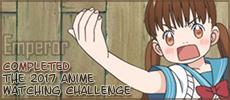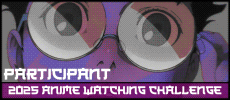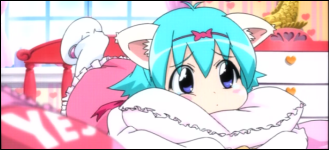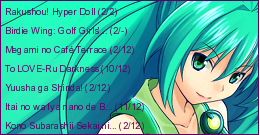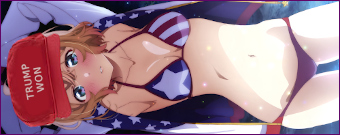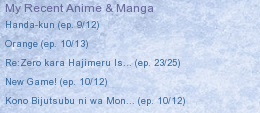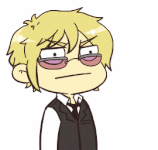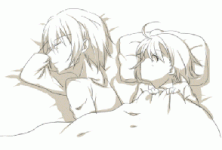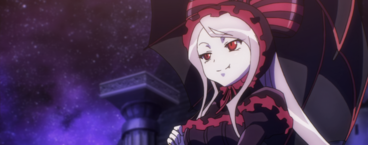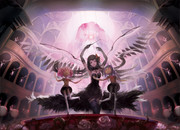ENMADDENED WRITING TO BE SUBMITTED TO THE UNHOLY BUT UNITED CONSCIOUSNESS OF MYANIMELIST ON THE UNINTELLIGIBLE THOUGHTS OF A MAN WHO HAD WATCHED TWELFTH EPISODE OF THE WORK, HAIBANE RENMEI
• It just dawned on me on how close I am to the finale. It’s a bit of a shame to say this, but it felt like not much happened in the entire series. The show spent five episodes establishing the cast. Then, there was Kuu’s death. Afterwards, there was Rakka’s reaction to Kuu’s death. Now, we’re here at Reki’s arc. I’m honestly a bit disappointed.
• I also just realized how little the weird setting of the show has actually been explained. It really seems to be going for the “metaphor for life and stuff about life” route that most artsy stories go with. I’m fine with that approach, but it does dissatisfy my curiosity.
• The red bell nut of foreshadowing.
• “Reki is not the type to ask for help”. Rakka’s response, “You just don’t realize it because Reki smiles even when she’s suffering.” So, this show really is about depression. I thought it was gonna be an iyashikei about religion and heaven and stuff. What the hell?
• All I’m hoping for here at the very least is what the hell the wall is supposed to be!
• It took me a while to realize, but Rakka’s hand gestures were her trying to copy the characters on the sign on the wall which were described by her in a previous episode as looking like hands.
• What if Rakka’s past life could be some sort of metaphor for the earlier stage of one’s life where trauma or sin is present?
• Also, symbolic names. I should’ve seen that coming, but I guess I didn’t know enough Japanese to notice.
• What the hell does INVOLVED NUT mean!? Like, the only thing that makes sense is as a metaphor for fapping.
• I’m being too harsh on it. The nut could represent Rakka’s strength of character yet gentle inside. She’s heavily involved with helping out Reki and her suffering. However, that just seems like Everyone is Jesus in Purgatory. (Sorry. That’s TVTropes talk.)
• I guess the main theme of the show has now been fully stated, right here in sentence form. “One cannot forgive one’s self. You cannot help but go around in circles alone, but if you have someone on your side…” I don’t think I have to elaborate on that. The show states the theme plainly and clearly.
• Of course, the show seems to also know that that “someone on your side” is really trying their best to be “on your side”. To help someone with depression is not an easy task, and it takes a lot of struggling and hardship to do so. We see this when Rakka breaks down crying in the previous episode.
• Also, something to notice is that Rakka first realizes that Reki is suffering when Rakka herself was struggling. One must know suffering to discover those of others.
• “When I looked out from here for the first time, I was a little afraid, thinking that I came to a world I didn’t know. But now, this is where I feel most secure, because you are always here.” Ignoring how yuri this sounds, Rakka is telling Reki that Reki is important to her. It’s a classic depression-story trope. For good reason of course. Making someone with depression feel appreciated is probably the most effective technique in the book.
• That line also manages to show how far Rakka has gone from the start of this show.
• Eyyy… Sumika’s baby is born!
• I’m surprised all the other side character’s the cast were giving bell nuts to weren’t going around giving bell nuts themselves and enjoying the festival.
• Midori’s running animation as she went to catch Reki before the festival ends was stupid and ugly. It had low frames and its horizontal movement speed does not match the length of her strides. Honestly, an angle change from a wide shot to an extreme wide shot (where all the characters are little silhouettes) or a close-up to her face would improve it all.
• The sound that is played when Rakka collapses onto the ground after hitting the drainpipe does not match the actual intensity of the collapse. Like, that’s a TREE collapse sound, not a “person sits on snow due to exhaustion” sound.
• After the slow version of the main theme “ailes grises” plays, I went and googled what “ailes grises” meant. It means “gray wings”.
• Fireworks. Hikari and Kana could’ve just said fireworks. I guess they just don’t have the word for fireworks there. But “too good for words”? Am I the only one who finds fireworks overrated?
• Oh shit. That may not be what they were referring to earlier. It’s Hyohko doing these, and it doesn’t seem to be part of the actual tradition and custom of the festival. I mean, Reki was actually surprised even when we know this isn’t the first time she’s had the festival.
• When Midori starts balling up and crying, Rakka just looks at her and walks away. This strikes a chord with me because I have done this before several times, and is usually what I do. She’s not sure what exactly to do, so she just walks away. Luckily, Reki comes down.
• Oh shit. The walls GLOW! THEY GLOW!!!
• This episode makes it clear what this show actually is now. It’s a piece on depression. It’s one of those “the person who helps me with my depression also has depression” pieces. This is not a common plot in anime (although I feel like I’ve encountered it in another anime. I just can’t put my finger on it.) This plot however has been gaining a fair amount of use recently especially because of the Tumblr boom of the mid to late-2010s wherein this plot comes up in many Tumblr short stories and Tumblr-style stories and novels. (It propped up once in an r/writingprompts story and it was used as a clever plot twist). It’s not usually my cup of tea because they’re often a bit too edgy for me to handle, but I think this show uses it fairly well. All the characters are fairly realistic without coming off as self-righteous as some of these stories sometimes do (by making the depressed characters sinless (I’d elaborate on this further one day but not today)). A notable difference from those other stories is that Haibane Renmei is an actual full-cour series with an entire thirteen episodes of plot. Usually, the stories with this kind of plot are short, lasting a 300-page novel at most. Here, in this show, all the characters manage to get more characterized and get developed more. Because of the extra length, we can take a step back and see the same kind of plot but from an earlier starting point, before the protagonist has his depression and far before the big brother/sister character’s depression is apparent (but hinted at constantly). This contrasts with the typical Tumblr stories that start out right in the middle or even near the end of the protagonist’s depression. Because of the show’s special structure, we get to see not just what depression is and how to get out of it but how it starts and how it develops and grows into something more. This further examination of depression gives the events far more meaning. This allows us to understand depression more, and the more we understand the feelings of characters such as depression, the more we connect with the characters. It also REALLY helps that the protagonist is not at all as sarcastic as the usual protagonist of this kind of plot.
• Overall, a great episode. The show is already rearing to end. It’s clear that it never wanted to be big. It’s also clear that little of the strange setting is going to actually be explained. At this point though, it doesn’t really matter to me. A lot of the symbols (except for the walls because those are still pretty weird) match up really well with the “the person who helps me with my depression also has depression” plot tropes. The crow, for example, that “forgives” Rakka in the well could parallel the character archetype that forgives the protagonist for a past sin the protagonist has done. Rakka’s assertive side is apparent in this episode, taking the courage to defend Reki when Midori and Hyohko talk about her and generally doing her best for Reki. It’s quite a sight, really. It’s not like she changed or anything from before in this respect. Rakka probably would’ve done things with the same passion too back at the start of the show if she had the motivation back then. The only difference now is that she has motivation which she got by finding out about Reki’s suffering. Midori and Hyohko’s character arcs are already coming to an end (although I feel like they need one last talk with Reki for closure). Reki herself wasn’t really fleshed out more than the previous episodes, but the events of this episode mostly revolve around Rakka doing what she can to help Reki, not Reki herself.. There was still the iffy animation and interesting but also often janky direction this episode, but I’ve come to expect that from the show. Overall, a strong point of the show. Let’s hope the finale builds on this strength.
• I just noticed. The crows are gone. They’re not important anymore.
|











